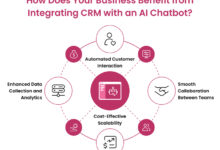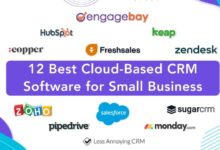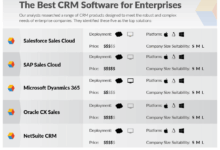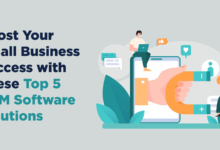Affordable CRM Software for Startups
Affordable CRM Software for Startups is crucial for early-stage businesses aiming for efficient growth. Finding the right balance between functionality and budget is key, especially when resources are limited. This guide explores how startups can select, implement, and leverage affordable CRM solutions to maximize their return on investment and achieve sustainable growth.
We’ll delve into defining “affordable” within the context of various startup sizes and industries, examining both upfront costs and hidden expenses. Key features crucial for startups will be identified, contrasting them with those needed by larger enterprises. We’ll also highlight popular, reputable, and cost-effective CRM options, providing comparisons and practical implementation advice. Finally, we’ll discuss strategies for measuring ROI and future-proofing your CRM strategy for long-term success.
Defining “Affordable” for Startups
Affordability in CRM software for startups is a relative concept, heavily influenced by various factors beyond just the price tag. It’s not simply about the lowest cost; it’s about finding the best value for money considering a startup’s specific needs, growth trajectory, and financial resources.
Factors Influencing Affordability Perceptions for Startups
Several key factors shape a startup’s perception of affordable CRM software. These include the startup’s stage of development (seed, Series A, etc.), industry (e.g., SaaS, e-commerce, healthcare), team size, current revenue, and projected growth. A bootstrapped startup with limited funding will have a vastly different definition of “affordable” than a well-funded startup in a high-growth sector. Furthermore, the perceived value proposition of the software plays a crucial role; a slightly more expensive solution offering significant time savings or improved sales conversion rates might be considered more affordable in the long run.
Budget Ranges for Affordable CRM Software
Affordable CRM software budgets vary significantly depending on startup size and industry. A solopreneur might consider a solution costing $0-$50 per month affordable, while a startup with 10 employees and significant sales volume might comfortably allocate $500-$2000 per month. High-growth SaaS companies might spend considerably more. For example, a small e-commerce business might find a solution in the $100-$300 range sufficient, whereas a rapidly scaling healthcare startup could justify a higher investment, potentially in the $1000-$3000 range, reflecting the need for more robust features and compliance capabilities.
Hidden Costs of CRM Software
Beyond the initial subscription or purchase price, several hidden costs can significantly impact the overall expense. These include:
* Implementation Costs: Setting up the CRM, customizing it to fit your specific needs, and migrating existing data can require significant time and effort, potentially needing external consulting or internal staff time.
* Integration Costs: Connecting the CRM with other essential business tools (e.g., marketing automation, accounting software) often involves additional fees or developer time.
* Training Costs: Employees need training to effectively use the CRM. This could involve paid training courses, internal training sessions, or lost productivity during the learning curve.
* Maintenance and Support Costs: Ongoing maintenance, updates, and technical support can add up over time, especially with complex systems.
* Customization Costs: Tailoring the CRM to meet unique business processes might require custom development, adding considerable expense.
Comparison of CRM Pricing Models
The choice of pricing model significantly impacts affordability. Different models cater to different startup needs and financial situations.
| Pricing Model | Description | Suitability for Startups | Pros | Cons |
|---|---|---|---|---|
| Subscription (monthly/annual) | Recurring payments for access to the software. | Generally suitable for most startups, offering flexibility and scalability. | Predictable costs, regular updates, access to support. | Ongoing expense, potential for cost increases over time. |
| One-time Purchase | A single upfront payment for perpetual access. | Suitable for startups with limited budget and predictable needs. | No recurring costs. | No updates or support after purchase, potential for obsolescence. |
| Freemium | Free basic version with paid upgrades for advanced features. | Suitable for very early-stage startups with limited budgets and basic needs. | Low initial cost, opportunity to upgrade as needed. | Limited functionality in the free version, potential for unexpected upgrade costs. |
Key Features for Startup CRM Software
Choosing the right CRM is crucial for a startup’s success. Unlike established companies with complex needs, startups require a lean, efficient system focused on core functionalities that deliver a high return on investment. This section outlines the essential features, emphasizing scalability and integration capabilities for optimal growth.
Essential features for a startup CRM differ significantly from those needed by larger enterprises. Startups prioritize simplicity, ease of use, and a quick return on investment. Overly complex systems with numerous features that are rarely used can be counterproductive and costly. Instead, a focus on core functionalities that directly impact sales, marketing, and customer relationships is paramount.
Essential CRM Features for Startups
Startups benefit most from a CRM that streamlines core processes. Features like contact management, lead tracking, and basic reporting are crucial for efficient operation and informed decision-making. Advanced features, while potentially useful, are often unnecessary in the early stages and can be added later as the business grows and its needs evolve.
- Contact Management: A robust system for storing and organizing customer information, including contact details, interaction history, and notes. This allows for personalized communication and efficient follow-up.
- Lead Tracking and Management: Tools to capture, qualify, and nurture leads throughout the sales pipeline. This includes features for assigning leads to sales representatives, tracking their progress, and identifying potential bottlenecks.
- Sales Pipeline Management: Visual representation of the sales process, allowing for easy monitoring of deals at each stage. This enables better forecasting and identification of areas needing improvement.
- Basic Reporting and Analytics: Simple dashboards providing key metrics such as lead conversion rates, sales performance, and customer engagement. This facilitates data-driven decision-making.
High-Return Investment Features
Certain CRM features provide a disproportionately high return on investment for startups. These features directly impact revenue generation and customer satisfaction, justifying the cost of the software.
- Lead Scoring: Automatically prioritizes leads based on pre-defined criteria, allowing sales teams to focus on the most promising prospects. This improves efficiency and increases conversion rates. For example, a startup might score leads based on website engagement, email opens, and industry.
- Email Integration: Seamless integration with email marketing platforms enables personalized communication and automated follow-up. This allows for efficient nurturing of leads and building strong customer relationships. A company like Mailchimp’s integration with a CRM could automate email sequences based on lead progress.
- Task Management and Reminders: Keeps sales representatives organized and on track with their tasks, ensuring timely follow-up and preventing missed opportunities. This reduces the risk of lost leads and increases sales productivity.
Scalability in Startup CRM Software
Choosing a scalable CRM is vital for startups anticipating growth. A system that can easily adapt to increasing data volumes, user numbers, and feature requirements saves time and money in the long run. Switching CRMs as the business grows is disruptive and costly.
A scalable CRM allows your business to grow without being constrained by your software.
Integration Capabilities
Seamless integration with other startup tools is crucial for a streamlined workflow. This includes marketing automation platforms, email marketing services, and other applications used in daily operations. Integration eliminates data silos and enables a holistic view of the customer journey.
- Marketing Automation Integration: Connecting the CRM with marketing automation tools enables automated lead nurturing, personalized email campaigns, and targeted advertising. This improves lead generation and conversion rates.
- Email Marketing Integration: Allows for efficient email marketing campaigns, personalized communications, and automated follow-up sequences based on customer interactions within the CRM.
- Other Integrations: Depending on the startup’s specific needs, integration with other tools like accounting software, project management platforms, and social media management tools can significantly enhance efficiency.
Popular Affordable CRM Options
Choosing the right CRM for your startup is crucial for managing customer relationships and driving growth. Many affordable options cater specifically to the needs and budgets of early-stage businesses, offering a balance of functionality and cost-effectiveness. This section explores some popular choices and compares their key features.
Popular Affordable CRM Software Options
Several reputable and affordable CRM software solutions exist, each with its own strengths and weaknesses. Consider factors like ease of use, scalability, integration capabilities, and available support when making your decision. Some well-regarded options include HubSpot CRM (free plan available), Zoho CRM (various pricing tiers), Pipedrive (various pricing tiers), and Freshsales (various pricing tiers). These platforms offer a range of features suitable for startups at different growth stages.
Comparison of Three Leading Affordable CRM Solutions
The following table compares three leading affordable CRM solutions: HubSpot CRM, Zoho CRM, and Pipedrive. This comparison focuses on features relevant to startups, pricing models, and ease of use.
| Feature | HubSpot CRM | Zoho CRM | Pipedrive |
|---|---|---|---|
| Pricing | Free plan available; paid plans start at a low monthly cost. | Various plans with different feature sets and user limits; affordable options available for small teams. | Various plans with different feature sets and user limits; affordable options available for small teams. |
| Ease of Use | Intuitive interface; generally considered user-friendly. | Relatively easy to use, though the extensive feature set might require some learning curve. | Clean and straightforward interface; focused on sales pipeline management, making it easy to learn. |
| Key Features | Contact management, email marketing, deal tracking, reporting. | Contact management, sales automation, customer support features, marketing automation. | Sales pipeline management, deal tracking, contact management, reporting. |
| Integration | Integrates with a wide range of popular apps. | Integrates with many apps; extensive integrations available. | Integrates with several popular apps; integrations are expanding. |
Comparative Chart of Affordable CRM Platforms
This chart highlights the strengths and weaknesses of different affordable CRM platforms. Remember that the “best” CRM depends heavily on your specific startup’s needs and priorities.
| CRM Platform | Strengths | Weaknesses | Best Suited For |
|---|---|---|---|
| HubSpot CRM | Free plan available, user-friendly, extensive integrations. | Some advanced features are only available in paid plans. | Startups with limited budgets needing basic CRM functionality and marketing tools. |
| Zoho CRM | Comprehensive feature set, affordable pricing options, good customization. | Can be overwhelming for users who need only basic features; might require a steeper learning curve. | Startups needing a wide range of features and potential for future scalability. |
| Pipedrive | Simple and intuitive interface, strong focus on sales pipeline management, excellent for sales-driven startups. | Fewer marketing features compared to HubSpot or Zoho. | Sales-focused startups that prioritize a clean and efficient sales process. |
Implementation and Training
Successfully implementing affordable CRM software requires a well-defined plan encompassing data migration, employee training, and ongoing support. A smooth transition minimizes disruption and maximizes the software’s benefits for your startup. Failing to properly plan for these aspects can lead to user frustration, data inaccuracies, and ultimately, a failed CRM implementation.
Implementing affordable CRM software within a startup involves a series of crucial steps. Careful planning and execution are vital to ensure a seamless transition and maximize the return on investment.
Data Migration Strategies
Effective data migration is critical for a successful CRM implementation. A poorly executed migration can lead to data loss, inconsistencies, and wasted time. Prioritize data cleansing and validation before the migration to ensure data accuracy in the new system.
The process typically involves several key steps:
- Data Assessment: Analyze existing data sources, identifying the data fields needed in the new CRM and assessing data quality.
- Data Cleansing: Cleanse and standardize data to ensure accuracy and consistency. This includes removing duplicates, correcting errors, and formatting data consistently.
- Data Mapping: Map existing data fields to the corresponding fields in the new CRM system. This step ensures that data is correctly transferred.
- Data Migration: Utilize the chosen CRM’s data import tools or third-party migration services to transfer the data. Consider a phased approach for large datasets.
- Data Verification: After the migration, thoroughly verify the data integrity in the new CRM system to ensure accuracy and completeness.
Employee Training Programs
Comprehensive employee training is paramount for maximizing CRM adoption and utilization. Training should be tailored to different roles and levels of technical expertise within the startup. Consider a blended learning approach combining online modules, hands-on workshops, and ongoing support.
A structured training program should include:
- Needs Assessment: Identify the specific training needs of different employee groups based on their roles and responsibilities.
- Curriculum Development: Create a training curriculum covering key CRM features, functionalities, and best practices relevant to each role.
- Training Delivery: Deliver training using a mix of methods, including online modules, interactive workshops, and one-on-one coaching.
- Knowledge Assessment: Assess employee understanding and proficiency through quizzes, practical exercises, or simulations.
- Ongoing Support: Provide ongoing support through FAQs, documentation, and readily available assistance from designated CRM experts.
Ongoing Support and Maintenance
Continuous support and maintenance are essential for maximizing the value and longevity of your CRM investment. Regular updates, bug fixes, and system optimizations are crucial for ensuring optimal performance and preventing data loss. Proactive maintenance reduces the risk of costly downtime and data breaches.
Key aspects of ongoing support include:
- Regular software updates to address bugs and enhance functionality.
- Proactive system monitoring to identify and resolve potential issues before they impact operations.
- Access to technical support channels for resolving issues and seeking assistance.
- Regular data backups to protect against data loss.
- User training and support to ensure continued proficiency.
Measuring ROI of CRM Software
Measuring the return on investment (ROI) of your CRM software is crucial for justifying its cost and ensuring its continued effectiveness. A well-implemented CRM system should demonstrably improve sales efficiency, customer satisfaction, and overall business performance. Tracking the right metrics and analyzing the data effectively will reveal whether your investment is paying off and highlight areas for optimization.
Tracking Key Performance Indicators (KPIs) related to CRM Software Usage. Several key performance indicators (KPIs) can be used to track the effectiveness of your CRM software and demonstrate its ROI. These KPIs provide quantifiable data to show the impact of the CRM on various aspects of your business.
KPIs for Measuring CRM ROI
To effectively measure the ROI of your CRM system, it’s essential to track a range of relevant KPIs. These metrics will provide a comprehensive view of the system’s impact on your business. For example, monitoring lead conversion rates can show the effectiveness of your sales processes, while customer satisfaction scores (CSAT) reflect the impact on customer relationships. Similarly, tracking the number of deals closed can directly reflect revenue generation.
- Lead Conversion Rate: This metric tracks the percentage of leads that convert into customers. An increase in this rate indicates improved lead nurturing and sales efficiency. For example, a conversion rate increase from 5% to 10% represents a significant improvement.
- Customer Acquisition Cost (CAC): This shows the cost of acquiring a new customer. A decrease in CAC signifies that the CRM is helping to streamline the sales process and reduce marketing expenses. A decrease from $500 to $300 per customer represents a significant saving.
- Customer Lifetime Value (CLTV): This metric calculates the total revenue generated by a customer over their entire relationship with your business. A higher CLTV indicates that the CRM is contributing to increased customer loyalty and retention.
- Sales Cycle Length: This measures the time it takes to close a deal. A reduction in the sales cycle length indicates improved sales efficiency. For example, reducing the sales cycle from 3 months to 2 months is a substantial improvement.
- Customer Satisfaction (CSAT): This metric measures customer satisfaction with your products and services. High CSAT scores indicate improved customer relationships and loyalty, which directly contributes to the ROI of your CRM.
Examples of Reports Showcasing CRM ROI
Regular reporting is essential to monitor the effectiveness of your CRM system. These reports should clearly demonstrate the financial benefits and operational improvements achieved through CRM usage. The reports should be tailored to your specific business goals and KPIs.
| Report Type | Data Points | ROI Demonstration |
|---|---|---|
| Sales Performance Report | Leads generated, conversion rates, revenue per lead, sales cycle length | Shows increased revenue and improved sales efficiency due to better lead management and tracking. |
| Customer Satisfaction Report | CSAT scores, customer feedback, Net Promoter Score (NPS) | Demonstrates improved customer loyalty and retention, leading to increased lifetime value. |
| Marketing ROI Report | Marketing campaign performance, cost per acquisition, return on ad spend | Shows the effectiveness of marketing campaigns in generating qualified leads and driving sales. |
| Support Efficiency Report | Number of support tickets resolved, average resolution time, customer satisfaction with support | Highlights improved efficiency in customer support, leading to cost savings and increased customer satisfaction. |
Identifying Areas for Improvement in CRM Usage
Continuous monitoring and analysis of your CRM data are vital for identifying areas needing improvement. Regular reviews of your KPIs and reports will highlight bottlenecks or inefficiencies in your sales and customer service processes. This allows for proactive adjustments to optimize the system and maximize its ROI. For example, if the sales cycle length is consistently high, it might indicate a need for improved sales training or a more streamlined sales process.
“Regularly reviewing your CRM data and making adjustments based on your findings is key to optimizing its efficiency and maximizing its return on investment.”
Future-Proofing CRM Strategy
Choosing a CRM system for a startup isn’t just about immediate needs; it’s about laying a foundation for sustainable growth. A well-chosen CRM should adapt to your evolving business processes and scale alongside your expanding team and customer base. Ignoring long-term scalability can lead to costly migrations and disruptions down the line.
Selecting a CRM system with a view towards the future requires careful consideration of several factors. Prioritizing flexibility, scalability, and adaptability ensures the system remains a valuable asset as your startup matures and its requirements change. This proactive approach minimizes the risk of outgrowing your CRM and needing to invest time and resources in a complete system overhaul.
Scalability and Adaptability Considerations
Choosing a CRM that can handle your projected growth is crucial. Consider factors such as the number of users, contacts, and interactions your system needs to manage. Cloud-based solutions generally offer better scalability compared to on-premise systems, as they can easily accommodate increasing data volume and user numbers without requiring significant infrastructure upgrades. For instance, a startup using a cloud-based CRM like Salesforce Sales Cloud could start with a small number of users and licenses, then easily scale up as the company expands, adding more users and features as needed. This eliminates the need for expensive hardware upgrades or complex system migrations.
Integration Capabilities
Seamless integration with other business tools is another key aspect of future-proofing. As your startup grows, you’ll likely adopt additional software for marketing automation, e-commerce, accounting, and other functions. A CRM that integrates well with these tools streamlines workflows and prevents data silos. For example, integrating your CRM with a marketing automation platform allows for automated lead nurturing and personalized communication, improving efficiency and customer engagement. A lack of integration capabilities can lead to manual data entry and reconciliation, which is time-consuming and prone to errors.
Customization and Extensibility
The ability to customize the CRM to meet your evolving needs is paramount. As your business processes mature and your understanding of customer interactions deepens, you may need to adapt your CRM workflows and reporting. A CRM that offers robust customization options, such as workflow automation, custom fields, and reporting dashboards, allows you to tailor the system to your specific requirements without requiring extensive coding. For instance, a startup might initially focus on lead generation and tracking, but as it grows, it might need to add features for customer support, sales forecasting, and project management. A customizable CRM can accommodate these changes without needing a complete replacement.
Data Migration Planning
While hoping to avoid it, the possibility of migrating data to a new system should be considered. Choosing a CRM with a well-documented API and data export capabilities simplifies this process. A smooth data migration minimizes downtime and ensures data integrity. Startups should develop a data migration plan as part of their overall CRM strategy, outlining procedures for data backup, export, and import. This plan should also address potential data cleansing and transformation needs to ensure data consistency and accuracy in the new system. This proactive approach minimizes disruption during any future system changes.
Final Conclusion
Selecting the right affordable CRM software is a pivotal decision for startups. By carefully considering factors such as budget, essential features, scalability, and integration capabilities, startups can leverage CRM technology to streamline operations, enhance customer relationships, and ultimately, drive growth. Remember that continuous monitoring of ROI and adapting your strategy as your business evolves are crucial for maximizing the value of your CRM investment.




